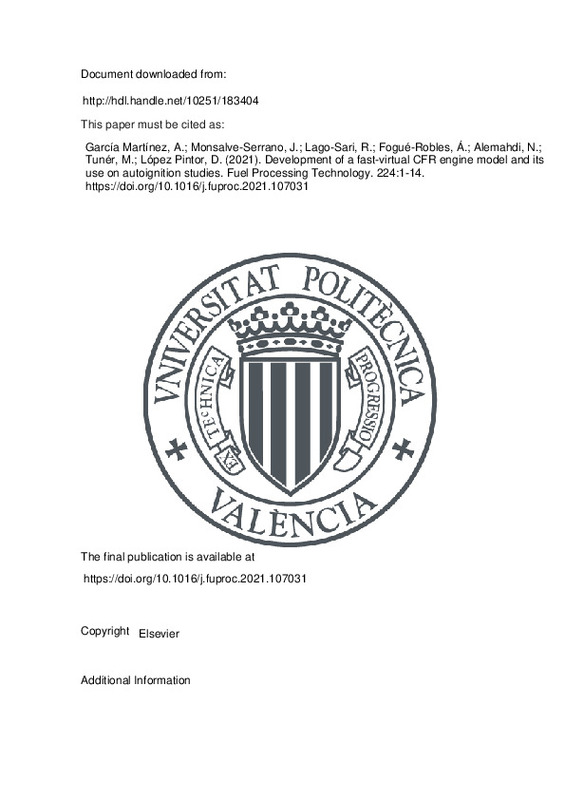JavaScript is disabled for your browser. Some features of this site may not work without it.
Buscar en RiuNet
Listar
Mi cuenta
Estadísticas
Ayuda RiuNet
Admin. UPV
Development of a fast-virtual CFR engine model and its use on autoignition studies
Mostrar el registro sencillo del ítem
Ficheros en el ítem
| dc.contributor.author | García Martínez, Antonio
|
es_ES |
| dc.contributor.author | Monsalve-Serrano, Javier
|
es_ES |
| dc.contributor.author | Lago-Sari, Rafael
|
es_ES |
| dc.contributor.author | Fogué-Robles, Álvaro
|
es_ES |
| dc.contributor.author | Alemahdi, Nika
|
es_ES |
| dc.contributor.author | Tunér, Martin
|
es_ES |
| dc.contributor.author | López Pintor, Darío
|
es_ES |
| dc.date.accessioned | 2022-06-16T18:05:40Z | |
| dc.date.available | 2022-06-16T18:05:40Z | |
| dc.date.issued | 2021-12-15 | es_ES |
| dc.identifier.issn | 0378-3820 | es_ES |
| dc.identifier.uri | http://hdl.handle.net/10251/183404 | |
| dc.description.abstract | [EN] Homogenous charge compression ignition engines have been studied as an alternative to the conventional diesel combustion to attain high efficiency with ultra-low NOx and soot emissions for a wide variety of fuels. However, its usage in real applications has been restricted due to the difficulties regarding combustion control and operating range extension. The modification of the fuel characteristics may be a pathway to solve the previous hurdles. Therefore, this research presents a relevant methodology to assess the fuel response to HCCI boundary conditions based on 0-D and 1-D modelling for detailed chemistry solution and state conditions definition, respectively. The results suggest that the methodology can predict the early stages of the fuel oxidation with good accuracy. For the objective of predicting the start of combustion, the best results are obtained using tabulated chemistry when investigating fuels that have pre reactions and a low temperature heat release. As the oxidation process progresses, the deviation of the pressure-temperature trajectory from non-reactive to reactive conditions after the low temperature heat release decreases the predictive capability to some extent. Nonetheless, the methodology outcomes are still valid as a qualitative metric for reactivity determination as well as the intermediate and high temperature ignition delay | es_ES |
| dc.description.sponsorship | This work has been partially funded by Spanish Ministry of Science, Innovation and Universities under the ¿Salvador de Madariaga¿ grant (PRX18/00131) and by the Swedish Energy Agency under the project ¿Future Alternative Transportation Fuels¿ and the project number 41139-1. The project partners were F3, Lantmannen, ¿ Perstorp AB, Preem, Scania AB, st1, Saybolt Sweden AB, Stena Line, Volvo AB, and Volvo Cars | es_ES |
| dc.language | Inglés | es_ES |
| dc.publisher | Elsevier | es_ES |
| dc.relation.ispartof | Fuel Processing Technology | es_ES |
| dc.rights | Reconocimiento - No comercial - Sin obra derivada (by-nc-nd) | es_ES |
| dc.subject | Cooperative fuel research engine | es_ES |
| dc.subject | HCCI | es_ES |
| dc.subject | Engine modelling | es_ES |
| dc.subject | Chemical kinetics | es_ES |
| dc.subject | Auto ignition | es_ES |
| dc.subject.classification | MAQUINAS Y MOTORES TERMICOS | es_ES |
| dc.title | Development of a fast-virtual CFR engine model and its use on autoignition studies | es_ES |
| dc.type | Artículo | es_ES |
| dc.identifier.doi | 10.1016/j.fuproc.2021.107031 | es_ES |
| dc.relation.projectID | info:eu-repo/grantAgreement/MCIU//PRX18%2F00131/ | es_ES |
| dc.relation.projectID | info:eu-repo/grantAgreement/Swedish Energy Agency//41139-1//Future Alternative Transportation Fuels/ | es_ES |
| dc.rights.accessRights | Abierto | es_ES |
| dc.contributor.affiliation | Universitat Politècnica de València. Departamento de Máquinas y Motores Térmicos - Departament de Màquines i Motors Tèrmics | es_ES |
| dc.description.bibliographicCitation | García Martínez, A.; Monsalve-Serrano, J.; Lago-Sari, R.; Fogué-Robles, Á.; Alemahdi, N.; Tunér, M.; López Pintor, D. (2021). Development of a fast-virtual CFR engine model and its use on autoignition studies. Fuel Processing Technology. 224:1-14. https://doi.org/10.1016/j.fuproc.2021.107031 | es_ES |
| dc.description.accrualMethod | S | es_ES |
| dc.relation.publisherversion | https://doi.org/10.1016/j.fuproc.2021.107031 | es_ES |
| dc.description.upvformatpinicio | 1 | es_ES |
| dc.description.upvformatpfin | 14 | es_ES |
| dc.type.version | info:eu-repo/semantics/publishedVersion | es_ES |
| dc.description.volume | 224 | es_ES |
| dc.relation.pasarela | S\446031 | es_ES |
| dc.contributor.funder | Swedish Energy Agency | es_ES |
| dc.contributor.funder | Ministerio de Ciencia, Innovación y Universidades | es_ES |







![[Cerrado]](/themes/UPV/images/candado.png)

